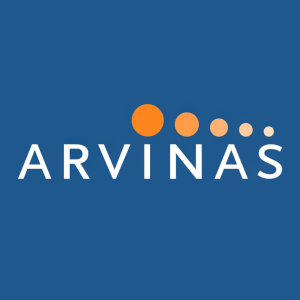Arvinas Announces First-in-Human Dosing of ARV-102, an Investigational PROTAC® Protein Degrader for Neurodegenerative Disease
– ARV-102 is a novel oral PROTAC® protein degrader designed to cross the blood-brain barrier and target leucine-rich repeat kinase 2 (LRRK2) –
– The Phase 1 trial of ARV-102 will evaluate safety, tolerability, pharmacokinetics, and pharmacodynamics in healthy volunteers –
NEW HAVEN, Conn., Feb. 20, 2024 (GLOBE NEWSWIRE) -- Arvinas, Inc. (Nasdaq: ARVN), a clinical-stage biotechnology company creating a new class of drugs based on targeted protein degradation, today announced that the first subject was dosed in its Phase 1 clinical trial of ARV-102, the Company’s first oral PROTAC® (PROteolysis-TArgeting Chimera) protein degrader in development to treat neurodegenerative diseases. In preclinical studies, ARV-102 has been shown to cross the blood-brain barrier and degrade leucine-rich repeat kinase 2 (LRRK2), which is a large multidomain scaffolding kinase. Increased activity and expressions of LRRK2 is genetically involved in the pathogenesis of neurological diseases including Parkinson’s disease and progressive supranuclear palsy.
In non-human primates, orally administered ARV-102 has been shown to reach deep-brain regions and degrade LRRK2 by nearly
“Parkinson’s disease and progressive supranuclear palsy are devastating diseases and this important step of dosing the first healthy volunteer with ARV-102 marks a significant milestone in our commitment to develop transformative therapies for patients living with neurodegenerative diseases,” said Angela M. Cacace, Ph.D., Senior Vice President, Neuroscience and Platform Biology. “There is a high unmet need in many neurologic diseases, and unlike other therapeutic modalities designed to inhibit LRRK2 activity, ARV-102 is an investigational oral PROTAC degrader uniquely designed to cross the blood-brain barrier and degrade the LRRK2 protein. As a pioneer in targeted protein degradation, we believe that PROTAC degraders have great potential to change the treatment paradigm for patients with neurodegenerative diseases.”
John Houston, Ph.D., Chairperson, Chief Executive Officer, and President, and Angela M. Cacace, Ph.D., Senior Vice President, Neuroscience and Platform Biology, provided an update on recent progress with ARV-102, as well as Arvinas’ preclinical pipeline of PROTAC protein degraders directed towards neurological disorders, in a webcast available on the Events & Presentations section of the Investors and Media section of the Company’s website.
About Arvinas
Arvinas is a clinical-stage biotechnology company dedicated to improving the lives of patients suffering from debilitating and life-threatening diseases through the discovery, development, and commercialization of therapies that degrade disease-causing proteins. Arvinas uses its proprietary PROTAC® Discovery Engine platform to engineer proteolysis targeting chimeras, or PROTAC targeted protein degraders, that are designed to harness the body’s own natural protein disposal system to selectively and efficiently degrade and remove disease-causing proteins. Arvinas applies its platform to develop treatments for diseases associated with historically “undruggable” targets. In addition to its robust preclinical pipeline of PROTAC protein degraders against validated and “undruggable” targets, the company has four investigational clinical-stage programs: vepdegestrant (ARV-471) for the treatment of patients with locally advanced or metastatic ER+/HER2- breast cancer; ARV-766 and bavdegalutamide for the treatment of men with metastatic castration-resistant prostate cancer; and ARV-102 for the treatment of patients with neurodegenerative disorders. For more information, visit www.arvinas.com.
Arvinas Forward-Looking Statements
This press release contains forward-looking statements within the meaning of The Private Securities Litigation Reform Act of 1995 that involve substantial risks and uncertainties, including statements regarding the potential advantages and therapeutic benefits of ARV-102, including the potential for ARV-102 to change the treatment paradigm for patients with neurodegenerative diseases, as well as plans and timing related to the Phase 1 clinical trial of ARV-102. All statements, other than statements of historical facts, contained in this press release are forward-looking statements. The words “believe,” “expect,” “may,” “plan,” “potential,” “will,” “continue,” and similar expressions are intended to identify forward-looking statements, although not all forward-looking statements contain these identifying words.
Arvinas may not actually achieve the plans, intentions or expectations disclosed in these forward-looking statements, and you should not place undue reliance on such forward-looking statements. Actual results or events could differ materially from the plans, intentions and expectations disclosed in the forward-looking statements made as a result of various risks and uncertainties, including but not limited to: whether Arvinas will be able to successfully conduct and complete clinical development forARV-102 on our current timelines or at all; Arvinas’ approach to the discovery and development of product candidates based on its PROTAC technology platform is unproven, which makes it difficult to predict the time, cost of development and likelihood of successfully developing any products; Arvinas’ ability to protect its intellectual property position; whether cash and cash equivalent resources will be sufficient to fund Arvinas’ foreseeable and unforeseeable operating expenses and capital expenditure requirements; and other important factors discussed in the “Risk Factors” section of the company’s Annual Report on Form 10-K for the year ended December 31, 2022, and subsequent other reports on file with the U.S. Securities and Exchange Commission. The forward-looking statements contained in this press release reflect current views with respect to future events, and Arvinas assumes no obligation to update any forward-looking statements except as required by applicable law. These forward-looking statements should not be relied upon as representing Arvinas’ views as of any date after the date of this release.
Arvinas Contacts
Investor Contact:
Jeff Boyle, Arvinas Investor Relations
+1 (347) 247-5089
Jeff.Boyle@arvinas.com
Media Contact:
Kathleen Murphy, Arvinas Communications
+1 (760) 622-3771
Kathleen.Murphy@arvinas.com








